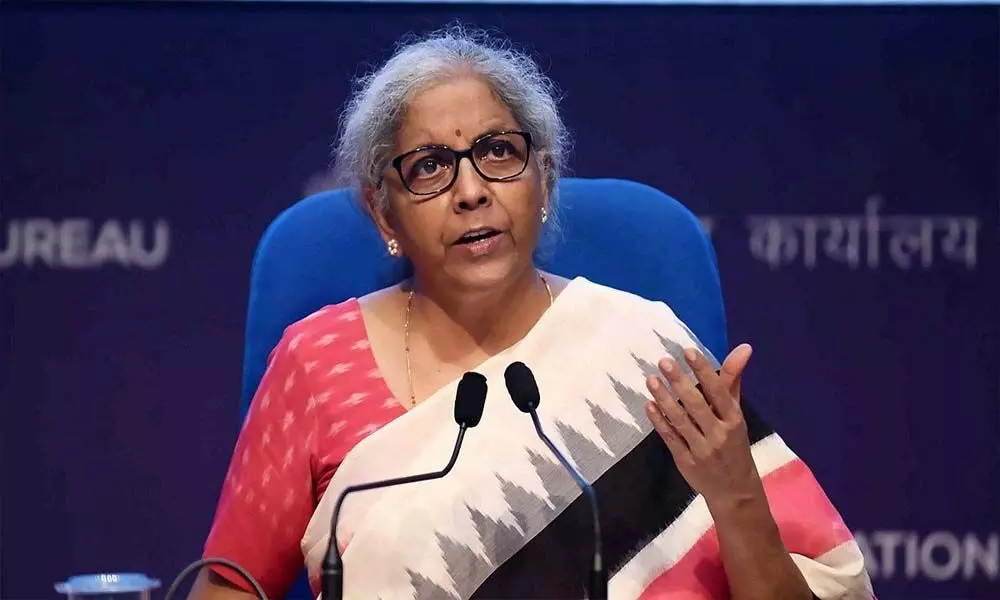No excise duty cut on petrol, diesel: Nirmala Sitharaman

Finance Minister Nirmala Sitharaman
- Inflation to be within target range in FY22
- Norms on retro tax to be framed soon
- Waiting for Cabinet nod on bill on crypto
New Delhi: Union Finance Minister Nirmala Sitharaman on Monday ruled out a cut in excise duty onpetrol and diesel to ease rates that have touched all-time highs, saying payments in lieu of past subsidised fuel price pose limitations.
The previous Congress-led UPA government had issued bonds to state-owned oil companies to make up for the difference in the artificially suppressed retail selling price of fuel and the cost. These oil bonds and the interest thereon are being paid now. Sitharaman said the government has paid over Rs60,000 crore interest in the last 5 years on these oil bonds and there still was an outstanding of Rs 1.30 lakh crore. "If I did not have the burden to service the oil bonds, I would have been in a position to reduce excise duty on fuel," she told reporters here.
Finance Minister Nirmala Sitharaman on Monday said that she expects inflation to remain in the prescribed range during the current fiscal. She further said the rules that will lead to the scrapping of the retrospective tax demands made on companies such as Cairn Energy Plc and Vodafone Plc will be framed soon. The RBI has been mandated to keep inflation at 4 per cent, with tolerance level of 2 per cent on either side.
She expressed confidence that the revenue would be buoyant in the coming months. Both Goods and Services Tax (GST) and direct taxes have improved in the past few months, the minister said. On the demand pick up, she said there is enough liquidity in the market and credit growth is expected to pick up in the coming festive season. Coming back to retro tax, Parliament earlier this month passed a Bill to scrap a tax rule that gave the tax department power to go 50 years back and slap capital gains levies wherever ownership had changed hands overseas but business assets were in India. The 2012 legislation was used to levy a cumulative of Rs 1.10 lakh crore of tax on 17 entities, including UK telecom giant Vodafone.
The bill provides for the government to refund the retro tax to companies provided all legal challenges are withdrawn. Now the rules for the same have to be framed, Sitharaman told reporters here. "Rules will have to be framed... rules will be famed soon." The government has to refund about Rs 8,100 crore that it had collected using the retro tax law. The bulk of this — Rs 7,900 crore is to Cairn Energy alone. While in other cases, it did not take punitive measures to recover the tax demand, the income tax department sold Cairn's near 10 per cent shareholding in its erstwhile Indian subsidiary and also seized its dividends totalling Rs 1,140 crore and stopped tax refunds of Rs 1,590 crore.
These oil bonds and the interest thereon are being paid now. "If I did not have the burden to service the oil bonds, I would have been in a position to reduce excise duty on fuel," she told reporters here.
"Previous government have made our job difficult by issuing oil bonds. Even if I want to do something I am paying through my nose for the oil bonds." Sitharaman, who had raised excise duty on petrol and diesel to record high to shore up revenue collections last year, said the interest on oil bonds paid in the last seven years totalled Rs 70,195.72 crore. Of the Rs 1.34 lakh crore of oil bonds, only Rs 3,500 crore of principal has been paid and the remaining Rs 1.3 lakh crore is due for repayment between this fiscal and 2025-26, she said.
The government has to repay Rs 10,000 crore this fiscal year (2021-22). Another Rs 31,150 crore is due to be repaid in 2023-24, Rs 52,860.17 crore in the following year and Rs 36,913 crore in 2025-26.














